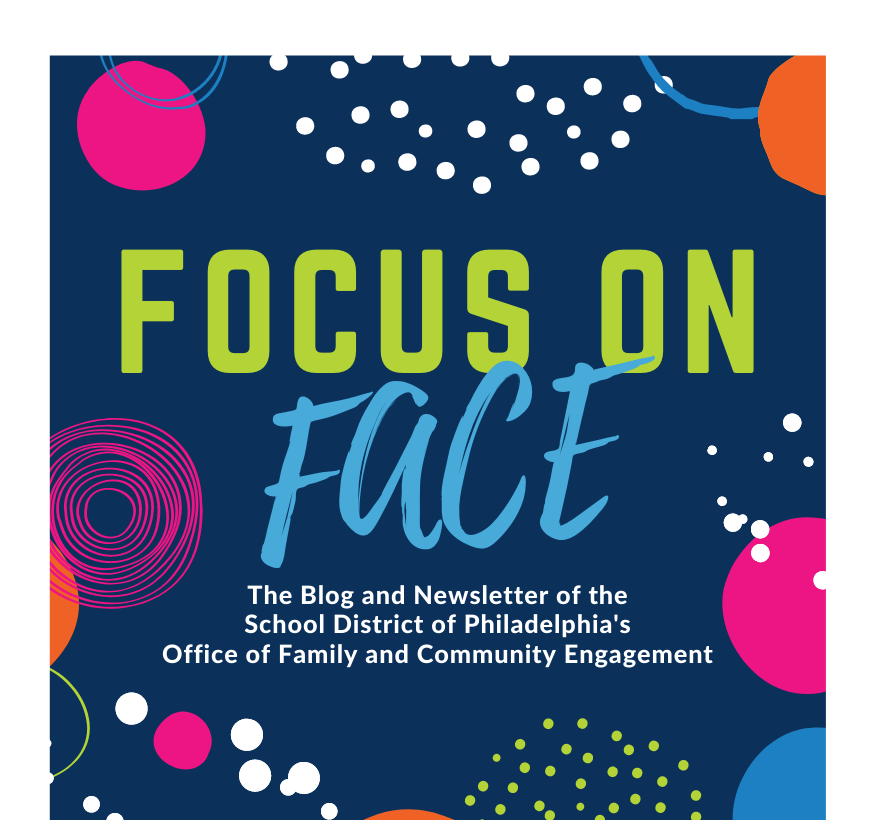Eric Marsh, Sr. is a father of four children, two of whom currently attend Edward T. Steel Elementary School. He is one of three partners at The Fathering Circle, which offers fathers discussion circles, presentations, workshops, and playdates for fathers and their children. He is also about to start a podcast with the same name.
 Mr. Marsh will be offering an eight week workshop called The Fathering Circle: Strengthening Family Bonds, which begins on March 7, 2018 as a part of The Office of Family and Community Engagement’s new program, Family Academy Courses & Training (FACT). The workshops aim to support “fathers to build a support network, gain parenting skills, and recover from those aspects of their upbringing as males that have limited their effectiveness as parents.” We sat down with Mr. Marsh to discuss The Fathering Circle, fathering in this moment in time, and the upcoming workshop series.
Mr. Marsh will be offering an eight week workshop called The Fathering Circle: Strengthening Family Bonds, which begins on March 7, 2018 as a part of The Office of Family and Community Engagement’s new program, Family Academy Courses & Training (FACT). The workshops aim to support “fathers to build a support network, gain parenting skills, and recover from those aspects of their upbringing as males that have limited their effectiveness as parents.” We sat down with Mr. Marsh to discuss The Fathering Circle, fathering in this moment in time, and the upcoming workshop series.
FACE on FACE (FoF): Tell us about yourself, your profession, and your connection to the School District of Philadelphia.
Eric Marsh (EM): I am the co-founder of an organization called The Fathering Circle, which focuses on peer-to-peer relationships and fathers examining our process of socialization as men in an effort to support women and children and their rights.
FoF: How did The Fathering Circle start?
EM: The Fathering Circle started as part of the Philadelphia Assembled Art Project. Billy Yalowitz was one of the original collaborators and editors for their different atmospheres. The lead artist, Janna Van Astwick, was one of the first people to point out the need for more fathers specifically, not just parents in general, to be involved in the Philadelphia Assembled Project.
So Billy reached out to our partner Les [Rivera], who is a filmmaker…that kind of became the working crew for collecting stories about fatherhood that was then going to inform the artwork they were going to present at The Fathering Circle.
Once we started gathering and talking, we realized that the process of meeting and discussing our upbringing and our relationships as fathers to our children and as sons to our parents was really where the heart of the work was. So, we started having what we called Father Circles, which were regular circle discussion groups of 6 to 10 men. We would just get together in the living room of one of our houses and talk. It started off as a one way exchange for fathers sharing their stories with myself, Billy, and Les to help us create art for Philadelphia Assembled, but what it turned out to be was much more of a healing process where we were able to grow together and become better fathers.
FoF: What would you all talk about?
EM: We would always start out with a certain set of questions. So one of the questions is: what was it like for you as a boy growing up and what were society’s expectations on you? And that would often open up and lead into discussions about male socialization and how we all pretty much have the same story of what society thinks a man is supposed to be. And then we would lead into the question: what was your relationship like with your father? And what would did you enjoy about it or like to be different? Many fathers identify that, in many cases, but not all, the fathers weren’t allowed to fully express themselves as full human beings with a full range of emotions. And that often created a barrier between parent and child.
We leave men a lot of space to open up and share a lot about their personal failings and their personal experiences but then are able to bring it back to the common thread that runs through all of our stories.
FoF: Where were these fathers coming from?
EM: We have a very diverse group of fathers with Philadelphia connections. Because the three of us are in some way connected to art or education, what we did is reach out to our personal networks, any fathers that we knew. So that was the initial set of fathers that came in. [That’s] one of the reasons we
call it The Fathering Circle, not only because of the literal circles we sit in, but we also found that one of the ways we’re attracting new dads is because of this concentric circle of relationships we have.
FoF: What challenges do fathers do fathers in Philadelphia and this region face in 2018?
EM: Well, the most recent issue we’ve been facing is the idea of gender equality and women’s rights and how men can be advocates for women, as opposed to being oppressors. I think that’s one of the core beliefs of what we do and what we discus. Even though we start out with the question of what was your boyhood like, one of our second or third questions is: what was your relationship to girls growing up? And it’s really a comparison; we get men to reflect on how they were raised and how they were raised in relation to how their sisters were raised. Or, their relationship with their father in comparison to their relationship with their mother. And we touch on the issue of sexual harassment, not directly, not in a heavy handed way, but more indirectly and from the position of what is your relationship with and to women in your life and do you raise your son different than you raise your daughter?
And it’s really a comparison; we get men to reflect on how they were raised and how they were raised in relation to how their sisters were raised. Or, their relationship with their father in comparison to their relationship with their mother. And we touch on the issue of sexual harassment, not directly, not in a heavy handed way, but more indirectly and from the position of what is your relationship with and to women in your life and do you raise your son different than you raise your daughter?
FoF: What are some of the more optimistic parts about fathering at this point in time?
EM: There is a global movement for men to be more involved and included in the process of fathering. And there are many men who are actually happily engaged fathers and because there’s no drama around it, you don’t really hear about it. So one of the things we’ve made a point to do is celebrate fathering…we highlight the joys and good things about fathering.
FoF: How did your involvement in FACT come about?
EM: I’m extremely involved in my children’s school, and always have been. I’ve been involved over the years through the Home and School Association and I’m the chairman of the SAC at Steel. So over the years I’ve always seen the need for parents being engaged and involved in their children’s lives and
education. The fact that the FACE Office is offering this opportunity for parents to come in to get more formalized training, education, and workshops on how to be better engaged, I just think is long overdue and is something that every parent really needs. So I just had to jump at the opportunity.
FoF: What was your process like for creating the workshop?
EM: The process was thinking about the end result – what did we want to occur? And because we’re working with fathers, we really want to look at the goal being a deeper, more meaningful engagement between parents and children.

The education piece is only one part of that. So what does it mean to be more deeply engaged? We tried to break down the different aspects of what it means to be a parent and how you relate to your children. We start off with the socialization – how are we socialized? How is our family and society training us or not training us, essentially, to become parents? And then we look at our relationships before parenting.
Another portion is getting parents to understand that it’s really important to listen to our children and follow our child’s lead at certain times. We often don’t take the time to recognize that there are some things that they are still better teachers about than we are.
FoF: What can people expect to take away from the session? Do they have to attend every week?
EM: I think it’s best to attend every week because every week we’ll be building on something we did in the previous week, but each week will have a separate topic.
What I hope they will take away are some new skills and strategies to be more deeply engaged with their family, not just their children. And also a deeper appreciation for themselves as parents, to actually recognize that parenting is very hard, it’s a hard job. Specifically as men, we’ve almost been socialized to not be parents, so those fathers who do show up and do want to be involved—it’s commendable, and they should pat themselves on the back for being able to do it.
For the mothers who might be attending, we want to honor them—to say, you have a hard job and often a thankless job because society expects this of you and it’s really not fair and balanced.
But overall, a deeper appreciation of being a parent and of your child as a whole human being.
The Fathering Circle’s workshop The Fathering Circle: Strengthening Family Bonds begins on March 7, 2018 and runs through May 31, 2018. Find more information about the workshop and register to attend here. Space is limited so reserve your seat now!
Learn more about The Fathering Circle at their website, https://thefatheringcircle.wordpress.com/or at their Facebook group page, The Fathering Circle.

